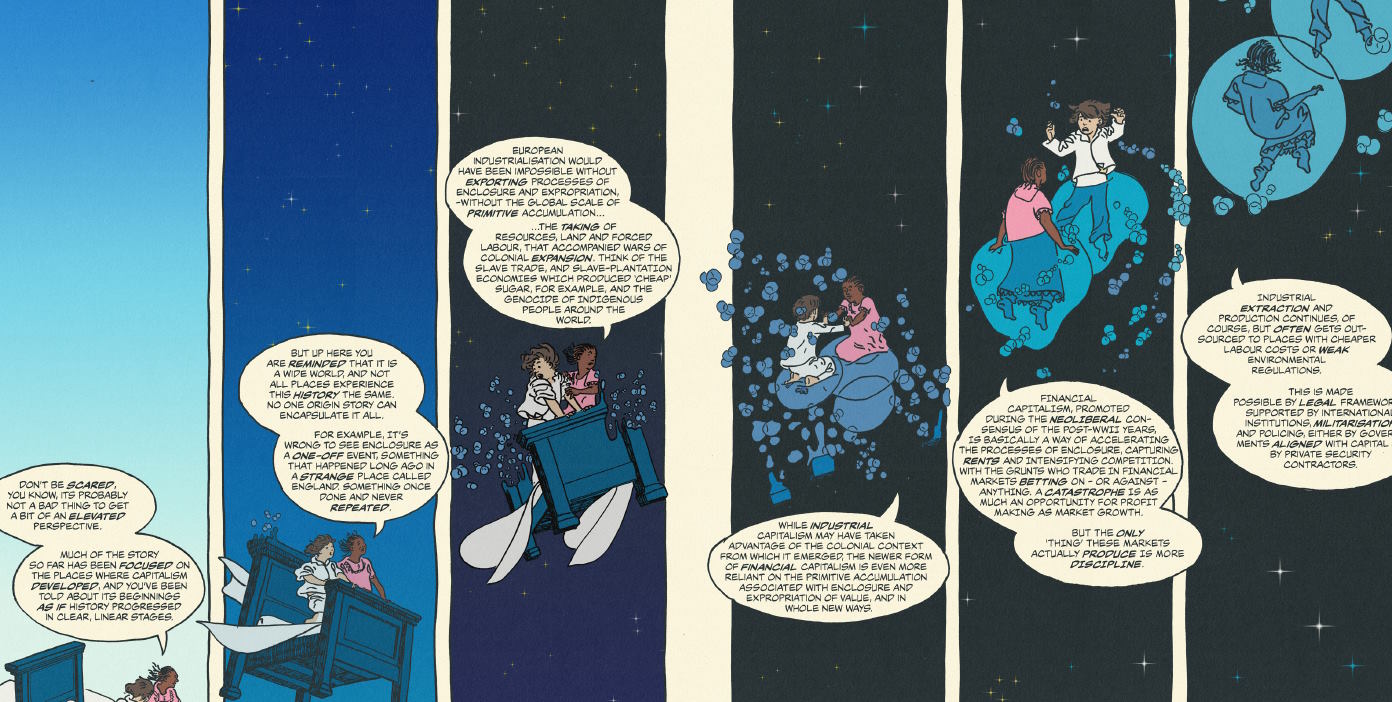Little Elle in Slumberland is the third in a series of comics from Future Natures – an epic journey into the strange world of capitalist ‘value production’, and the many other values that persist and resist in spite of it.
Introduction
Struggles to sustain and defend commons always involve contestations around (to borrow the words of the late anthropologist David Graeber) ‘value versus values’.
For the past couple hundred years at least, the nature of these struggles has been increasingly shaped by the contradictions inherent to capitalism’s need to impose its hegemonic notion of value – a quantitative relationship between things embodied in commodities – on diverse values: the uncountable ways that the importance of our own creative, productive and (re)generative labours, is made ‘real’ in our lives and the lives of others.
Imposing value
This dominant notion of value appears as if by magic to be a ‘natural’ property of commodities, represented as ‘price’.

Its imposition, as a measure of worth, operates through enclosure, involving powerful stories, technologies of surveillance and representation, state intervention and violence.
The aim is to claim, transform or subordinate the diverse values that bind together the social relationships – and socio-natural ones too – which are the true source of all the social wealth that exists in society in all its material and symbolic forms.
The story of enclosures
Karl Marx gave us a story that sought to cut through these illusions. The story placed value at the centre of capitalism’s mythology of being a totalising and self-reproducing system.
It’s a myth that exercises a peculiar politics, and structures an increasingly peculiar world.
Marx framed his analysis with an ‘origin story’ of capitalism, beginning with the ‘old enclosures’ and the violent dispossession of the English peasantry from common land, forests and other productive resources from the 13th Century.

The story of the old enclosures often ends there, with the impression of capitalism springing from the dismantled English feudal order.
But this is really where our story begins…
Little Elle…
In the years since Marx’s critique was published, political theorists, historians, activists and artists have offered productive critiques and added to the story from diverse perspectives and situated experiences of struggle.
In our comic, a young Eleanor Marx is lulled to sleep by a bedtime story from her papa. She is transported on an adventure to ‘Slumberland’, where she dreams an adventure that takes her through a handful of these stories that unpack, in different voices and at different times, dynamics of value production, enclosure and contestation.
The fact is: capitalism began as a set of abstract ideas in the ‘moral philosophy’ of (for the most part) elite, white, European men, about what a society is and how it should work to their benefit. Putting these imaginaries into practice – making the world appear to ‘fit’ its logics and conform to its weird notion of value – has always been a messy, violent and crisis-laden endeavour.

Because of this, capitalism has evolved in practice as a ‘variegated’ and plural system with numerous strategies and sets of ‘fixes’ that can, at least provisionally, mask, displace or ‘outsource’ crises by shifting them in time and across space in different ways.
Far from being consigned to history, capital’s enclosures (and the myths that justify them) continue to evolve, challenging us to understand and resist them in new ways.

Introduction by Amber Huff
A note on the style
Little Elle also contains a playful note of parody, being a shameless take-off of the much-loved comic strip Little Nemo, by Winsor McCay. Little Nemo first appeared in 1905, as comics soared in popularity in the USA as a source of entertainment and commentary.
In each strip Little Nemo goes to sleep and sinks into an adventure in the dream world, before waking at the bottom of the page. These adventures were by turns surreal, epic and often closer to nightmare.
Coming just six years after the publication of Freud’s The Interpretation of Dreams, it’s impossible as a contemporary reader not to see the nightly adventures of Little Nemo as somehow containing the soul of the 19th century, as if it were the very dream work of the capitalist mind of the time; WASPish, bourgeois, anxious, and not yet fully grown.
So what if…
What if there was another dream, an under-dream, where capital is not indulged but questioned? This is where the parodic fantasy of Little Elle began to take shape, taking Little Nemo as both inspiration and sport.
Read the comic
Download the comic or view it as a ‘flipbook’ online (opens in a new tab). For a high resolution copy that can be printed, email us: [email protected]




















More comics
To read more in this series, plus an archive of related material, browse our comics.
